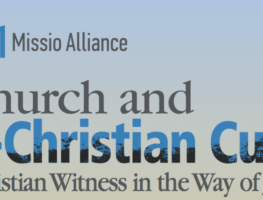I am in Orlando Florida for a few days at the General Conference of the C&MA. I am here to do (among other things) a talk about the theme “postmodernity as good news for the church.” The point I am trying to explore is put well by Dwayne Brothers (on his blog) who attended this same seminar I led at the Grow Center a couple weeks ago. Dwayne states my basic point as:
Postmodernity allows for a critique of the way modernism has captured the church. In essence it frees the church to be the church. We are free from the attractional model of church – producing goods and services for people shopping for services – to embrace a missional paradigm – that we are participating in the mission of God.
Now I have done this talk a few times. The idea that postmodernity is good news for the church is nothing new for surely James K A Smith did a version of this idea in his book Who’s Afraid of Postmodernism? My book The Great Giveaway takes a different approach (an ecclesiological approach) to the same end. What I am trying to do in these seminars is find a space to deconstruct the way we do church in America and reveal the sources of power, influence and rationality behind the ways we do things. Then I want to show a.) how these ways of being church are indeed (often) unfaithful to our calling (ekklesia), b.) tied to the cultural assumptions of modernity – not Christian ones, and c.) why they might be worth giving up because this culture of modernity we so esteem is in the process of a major crash and burn.
I would summarize the presentation like this. There are three broad shifts in the culture that postmodernity accentuates:
THE SHIFT in how we know: From … we know through universal processes of reason to … we know through participating in a community and its stories. I go into Lyotard here.
THE SHIFT in the way language works: From language represents reality to language being reality. I go into Derrida here.
THE SHIFT in the way I understand my-self in the world. From radical individualism to relational selfhood. I go into Foucault here.
My goal here is not to dazzle with postmodern analysis (couldn’t do it if I tried). Rather I wish to use postmodernity to do some “psycho-analysis” on the evangelical church revealing why we are the way we are. And then as with all good psycho-analysis … let us be freed to pursue being the church under the reign of Christ participating in His mission.
In the session …
I describe why there are no credible metanarratives (Lyotard). I then show why this means we must then more faithfully live our story. The expression of that is a more Missional church, a church driven by participating daily in God’s Story. Matt 6:33. 2 Cor 5:14-21.
I describe why truth is textual, communal. In a sense reality is created via community and language (Derrida). I then show why this means we must more intentionally reject violence for hospitality as our way of life in the world. The expression of that is a more Communal church. Acts 2: 41-47
I describe why our “selves” are always being technologized by the culture industries and multi national corporations (Foucault). I then show why this means we must reject consumerism in all its hideous forms for monastic practices of resistance in spiritual formation. The expression of that is a (more intentionally) Transformational church. Rom 12:1-2.
Notice, to all who would jump to conclusions, my primary drive is NOT to contextualize the gospel to a so-called postmodern culture. My first drive here instead is self-analysis of our own (evangelical’s) modernity. In fact for me, contextualization is a modern move that must be deconstructed. For so often contextualization assumes there is a message which can be extracted from a given culture and translated into another culture’s language and cultural practice. Yet this move in itself is naïve to the pitfalls of modernity. For it sets us up to repeat the errors of commodifying and/or consumerizing of the gospel. Instead I subscribe to a much slower approach (if indeed I am called to enter a foreign culture with the gospel). Let us as a church understand our own allegiances and cultural formation first. Then, with who we are and what God has given us (historically) let us take up (incarnational) residence in a different culture and allow God to build relationships in mutual submission out of which God works through hospitality, humility and love. Allow God to transform the relationships we participate in as we live the gospel in historically continuous enScripturated ways which shape those very relationships. Out of this, a community forms which indeed takes on its own cultural (Christian) identity forming a bridge into the new cultural context.
Each time I have done this seminar, the conversations, the irruptions and the rants have blown my mind. Today’s seminar was quite calm in comparison. Nonetheless, what is striking is the differences between the young and the not so young (those in ministry twenty plus years). And the openness of many pastors in smaller congregations (even some in the mega) is encouraging.
As always, in the search for improving my presentations, I welcome any comments, criticisms, and suggestions for improvement or things to add.
——-
Tommorrow (Sunday a.m.) we’ll be speaking with the gathering at Watermark, an emerging church gathering in Tampa Bay. Looking forward to it!







Missio Alliance Comment Policy
The Missio Alliance Writing Collectives exist as a ministry of writing to resource theological practitioners for mission. From our Leading Voices to our regular Writing Team and those invited to publish with us as Community Voices, we are creating a space for thoughtful engagement of critical issues and questions facing the North American Church in God’s mission. This sort of thoughtful engagement is something that we seek to engender not only in our publishing, but in conversations that unfold as a result in the comment section of our articles.
Unfortunately, because of the relational distance introduced by online communication, “thoughtful engagement” and “comment sections” seldom go hand in hand. At the same time, censorship of comments by those who disagree with points made by authors, whose anger or limited perspective taints their words, or who simply feel the need to express their own opinion on a topic without any meaningful engagement with the article or comment in question can mask an important window into the true state of Christian discourse. As such, Missio Alliance sets forth the following suggestions for those who wish to engage in conversation around our writing:
1. Seek to understand the author’s intent.
If you disagree with something the an author said, consider framing your response as, “I hear you as saying _________. Am I understanding you correctly? If so, here’s why I disagree. _____________.
2. Seek to make your own voice heard.
We deeply desire and value the voice and perspective of our readers. However you may react to an article we publish or a fellow commenter, we encourage you to set forth that reaction is the most constructive way possible. Use your voice and perspective to move conversation forward rather than shut it down.
3. Share your story.
One of our favorite tenants is that “an enemy is someone whose story we haven’t heard.” Very often disagreements and rants are the result of people talking past rather than to one another. Everyone’s perspective is intimately bound up with their own stories – their contexts and experiences. We encourage you to couch your comments in whatever aspect of your own story might help others understand where you are coming from.
In view of those suggestions for shaping conversation on our site and in an effort to curate a hospitable space of open conversation, Missio Alliance may delete comments and/or ban users who show no regard for constructive engagement, especially those whose comments are easily construed as trolling, threatening, or abusive.